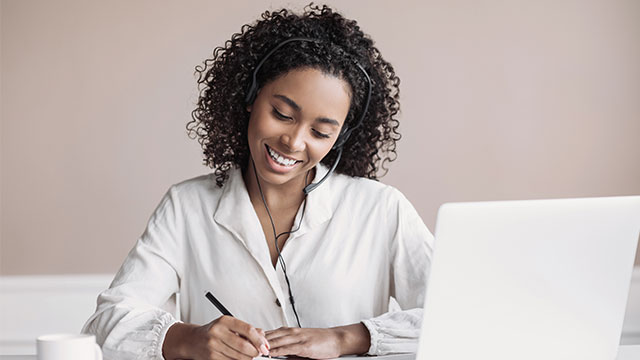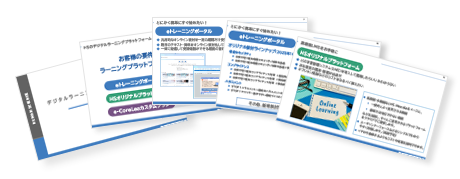2022.07.27
2025.07.06
[Moodle Basic Course] What can the e-learning management system Moodle do?
Moodle is an e-learning system equipped with features to support online and face-to-face classes. It is the number one choice in Japan as well as in European universities. It includes necessary functions for higher education, such as conducting tests and managing grades.

Table of Contents
1. What is Moodle?
1-1 Case Study ①: Mito Electronics College
1-2 Case Study ②: The Open University of Japan
1-3 Case Study ③: Tokyo University of Science
2. What can Moodle do?
2-1 Quizzes
2-2 Creating and Publishing Course Pages
2-3 Forums (Discussions)
2-4 Assignment Submission
2-5 Gradebook Management
2-6 Others
3. Advantages and Disadvantages of Moodle
3-1 Advantages of Moodle
3-2 Disadvantages of Moodle
4. About Moodle Implementation
4-1 What is Human Science?
4-2 Implementation Design
4-3 Operational Support
1. What is Moodle?

Moodle is the world standard LMS※2 for efficiently conducting e-learning※1. According to statistics from Moodle HQ, it is the world's largest educational platform with over 140,000 sites, more than 400 million users, and usage in 237 countries and regions. (*As of 2025)
It holds the No.1 share in universities in Europe and Japan, and is widely adopted not only in educational settings but also by global companies, government agencies, and other organizations worldwide.
The biggest reason Moodle continues to be chosen worldwide is that it is a world standard LMS, meaning it is a system refined and standardized by universities and other organizations around the globe.
By using this world standard system and implementing organizational reforms tailored to the system, it is possible to review the structure and nature of the organization and improve international competitiveness.
*1 E-learning refers broadly to educational systems that utilize IT technologies centered around computers and the internet. This includes everything from watching videos on sharing sites and solving problems with learning apps to remote classes conducted through web conferencing tools.
*2 LMS is an abbreviation for Learning Management System. An LMS is a system that centrally manages information such as participants, materials, progress, and grades necessary for e-learning. In recent years, there has been an increase in systems that not only manage but also integrate with employee performance management and provide personalized learning experiences as Learning Experience Platforms (LXP).
> [Moodle Basic Course] What is Moodle?
> Moodle Implementation Support and Operations
From the next section, we will describe the case studies implemented by Human Science, the official partner of Moodle, along with customer testimonials.
1-1. Case Study 1: Mito Electronic Vocational School
~Realizing the provision of online classes with Moodle, making it possible to offer classes even during school closures~
Introduction Background
Due to the declaration of a state of emergency, we found ourselves in a situation where we had to suspend classes immediately after the new students enrolled. At that time, face-to-face classes were the norm, but starting around February, when the impact began to be felt, we started gathering information about e-learning that could provide classes online and reached out to your company.
Selection Reasons
We considered multiple e-learning systems, but we decided on Moodle for the following reasons.
- ・Open source and reasonable implementation costs
- ・The manuals available online are comprehensive
- ・High market share in universities
We also considered multiple partners. The decision to choose Human Science was based on the following reasons.
- ・Quality of response during inquiries
- ・Proposal of plans tailored to the size of the school (up to 200 people)
- ・Extensive experience in operation and maintenance at universities
<Implementation Results>
- ・I made an inquiry in April, and it was implemented by May in about two weeks, which was helpful due to the quick response.
Also, the provision of the user manual was helpful. - ・We make the most use of tools for online learning remotely when situations arise that prevent students from attending school, such as school closures. When a school closure occurs, if we start preparing to transition to online classes after the regular classes have been interrupted, there will inevitably be a loss of time. However, by having regular classes in a hybrid format in advance, we can create a system that allows for a smooth transition even during school closures.
- ・Classes are mainly conducted in person, but we are exploring hybrid methods such as showing preview videos and implementing flipped learning. We are making efforts to enhance the quality of our classes while seeking ways to do things that cannot be achieved through in-person classes alone.
- It was also good that communication regarding classes could be made to students outside of class hours, allowing for asynchronous communication related to the classes.
1-2. Case Study ②: Open University of Japan
~Support for the operation of a web-based learning system and correspondence guidance with 85,000 participants and 250 courses~
Introduction Background
Before the introduction, there were three major issues in managing the submission of assignments from approximately 85,000 participants in communication guidance, using two methods: postal mail and a web system utilizing Moodle.
- ・85,000 participants, approximately 250 courses. It is not realistic for administrators to manually set up all 250 courses. This would require a tremendous amount of time and increase the likelihood of human error. You were considering measures to improve efficiency and prevent setting omissions.
- ・System downtime is never acceptable due to the paid service. It was necessary to verify the current system configuration in preparation for the increase in the number of users.
- ・Moodle frequently has minor version updates. Initially, it was planned to be carried out by the person in charge of operations, but due to other business commitments, they were unable to allocate time to implement it.
Reasons for Selection
Because the following three proposals from Human Science were very satisfactory.
- ・Proposed and developed a feature to batch set various items on Moodle. Achieved business efficiency through automation and prevention of setting omissions.
- ・Conducted load testing of the current system and performed parameter tuning based on the results.
Achieved a reduction in response time through parameter tuning.
Further conducted load testing to identify the causes of system bottlenecks and proposed optimal hardware specifications. - ・On behalf of the person in charge, we conducted updates for the middleware and Moodle in both the testing environment and the production environment.
<Implementation Results>
We were able to streamline operational tasks by developing various Moodle tools, such as bulk course registration.
By tuning the server we had been using, we achieved optimal performance, resulting in faster processing speeds.
Regarding the Moodle version upgrade, we greatly appreciated the consultation on the relationship with the OS and middleware updates of the server used by the institution, as well as your efforts in local adjustments at the institution.
1-3. Case Study ③: Tokyo University of Science
~Reduced inquiry response workload to 1/10 by utilizing Moodle Help Desk~
Introduction Background
- ・Due to the COVID-19 pandemic, the format of classes changed, and especially from the immediate aftermath of COVID-19 in the 2020 academic year, classes were changed to 100% online. Asynchronous classes using an LMS (Moodle) have increased, allowing students to learn assignments, materials, videos, etc., regardless of class time.
- ・Although we had been using Moodle for some time, at this point, there was a significant increase in inquiries from faculty members who were using Moodle for the first time, and the internal staff was handling these inquiries. However, including basic inquiries, there were over 100 inquiries per month, making it difficult to manage solely within the university. Therefore, we decided to look for a company that could provide help desk support, and we found Human Science, a Moodle partner company, through the Moodle website and reached out to them.
<Reasons for Selection>
Inquiries were made to three Moodle partner companies, including Human Science, for comparison and consideration.
The partners were selected primarily for the following reasons within the niche business of Moodle operation and maintenance.
- ・A company size that ensures reliability
- ・There are dozens of achievements in operation and maintenance at universities
- ・They provided a price that matched the conditions in terms of cost.
Furthermore, in addition to help desk support, as part of the measures to reduce inquiries themselves,
- ・Usage Seminar (Online Training)
- ・Improvement of manuals, translation (Japanese, English versions)
- ・Video Manual Creation
- ・Moodle server construction, performance investigation
It became a point of request as we understood that we could respond to such needs in a one-stop manner.
<Implementation Results>
The time spent on inquiries has decreased significantly from 100 hours per month to 10 hours during busy times.
- ・It was great that the content went beyond just answering inquiries and included suggestions as well.
- ・Regarding the manuals, in the past, there were voices saying they were "difficult to understand" and "hard to read," but now that improvements have been made, those issues have disappeared.
- ・Originally, the Moodle manual was in PDF format, making it difficult to find information among the vast number of pages. However, after the revision, it was restructured using Moodle's book feature. As a result, it was improved to a more user-friendly format that is easily viewable online from a browser, leading to better usability and a reduction in complaints from instructors.
- ・There have been requests for the English version of the Moodle manual for some time, but we had not been able to address this properly until now. This time, by providing the English version of the manual, it was our first response to this request, and it was very well received as it had been a long-standing demand.
- - Video manuals are being effectively utilized. I believe that having a well-organized set of content for faculty to review, along with a decrease in inquiries, is a significant benefit.
> e-Learning Implementation Achievements
> Moodle Implementation and Operational Support Achievements
You can also view case studies of Moodle implementation on this page
> Rapid Expansion of Moodle Use Due to COVID-19! Latest Status of Classes and Training Using LMS
> 4 Key Points for Comparing e-Learning and LMS (Learning Management Systems)
Reference URL:
> Moodle statistics (※Overseas site)
> 4 Key Points for Comparing e-Learning and LMS (Learning Management Systems) | e-Learning Blog | e-Learning by Human Science (hs-learning.jp)
> Yahagi Gakuen Mito Electronic Vocational School | e-Learning Case Studies | Many Achievements by Human Science (hs-learning.jp)
> The Open University of Japan | e-Learning Case Studies | Many Achievements by Human Science (hs-learning.jp)
> Tokyo University of Science | e-Learning Case Studies | Many Achievements by Human Science (hs-learning.jp)
2. What can Moodle do?

In the previous chapter, we learned what Moodle is and what issues it solves.
In this chapter, let's explore what can be done using Moodle.
2-1. Quiz
Moodle's quizzes are automatically graded. When learners take a quiz and submit their answers, the results graded by Moodle are presented to the learners. Immediately after submitting their answers, they can see the correct and incorrect responses as well as their scores, and hints (feedback) regarding the correct answers can also be provided. Instructors can view the answers and score history of the learners (i.e., general users). Additionally, it is possible to import question data created separately in formats such as XML from outside of Moodle.
Moodle allows for various types of quizzes, including multiple-choice questions, descriptive questions, numerical questions, fill-in-the-blank questions, calculation questions, and combination questions. Furthermore, there are many features that enable learners to study efficiently, and we will introduce some of them.
- ・A feature that randomly presents a certain number of questions from a question bank (a collection of numerous questions)
- ・Function to present questions at an appropriate level for the target learners
- ・Function to provide appropriate feedback on answers (hints and explanations of related matters)
- ・Anti-cheating features for learners (such as questions being randomly presented so that copying answers from others will not result in correct answers)
- ・Self-study tests to effectively identify and learn difficult areas by solving problems
2-2. Creation and Publication of Teaching Materials Page
Even without knowledge of how to upload to a web server or HTML, you can easily create and publish educational pages.
We use a JavaScript-based GUI HTML editor called htmlArea, which allows you to easily create and edit web pages in a word processor-like manner in your browser.
It is also possible to create pages in plain text format or in a simplified format called Moodle auto-format (plain text + some HTML tags). You can also easily upload files and set up links.
Records are kept of which users viewed which pages and when, and you can search through those records.
2-3. Forum (Discussion)
Moodle's "Forum" has the same functions as what is commonly referred to as a BBS or bulletin board.
There is also a feature that allows instructors to assign evaluation points to learners' posts. Additionally, there is a function that forwards the content of the posts to participants via email, which encourages them to log in to the Moodle site and helps to stimulate discussions.
2-4. Submission of Issues
This corresponds to the so-called report submission, which is a function to submit answers by writing text or uploading files. Compared to submitting via email attachments, it allows instructors to set submission deadlines within the system and efficiently collect and manage submissions, as they can easily see who has not submitted on the submission status screen. For report submitters, there is also the advantage of being able to keep various submissions stored in one place without them getting scattered.
2-5. Grade Report Management
Moodle has a management feature for grade reports called "grading."
You can view the grades for various "activities" (such as quizzes, forums, assignments, etc.) described above, as well as the total grades. Additionally, you can create a new column separately and input any numerical values. Not only can you input numbers, but you can also enter formulas to perform complex calculations. The formulas can include functions such as max(), round(), sqrt(), and more.
2-6. Others
In addition to this, various convenient features such as chat, messaging, lessons, polls, glossaries, and Wiki are available as standard features.
Besides the standard features, numerous modules and plugins developed independently by developers around the world are publicly available, and anyone can freely use these features by installing them additionally.
> Moodle Implementation and Operation Support Service
Reference URL:
> Moodle Features | No.1 in Domestic Achievements for Human Science (science.co.jp)
> Utilization and Customization of the e-Learning System Moodle: Series | gihyo.jp … Technical Review Company
> [Moodle Basic Course] What Can Be Done with Moodle's Default Features
3. Advantages and Disadvantages of Moodle

In the previous chapter, we introduced the features available in Moodle.
In this chapter, we will discuss the advantages and disadvantages of using Moodle.
3-1. Benefits of Moodle
・World Standard Platform
The main reason Moodle continues to be chosen worldwide is that it is a world standard LMS, meaning it is a proven system refined and standardized by universities and other organizations around the globe.
By using a world standard system and implementing organizational reforms tailored to the system, it is possible to review the structure and way of the organization and enhance international competitiveness.
In terms of achievements, it holds the No.1 market share among universities in Europe and Japan, and it is widely adopted not only in educational settings but also by global companies, government agencies, and other organizations worldwide.
Also, looking at the numbers, it is truly the world's largest educational platform with over 170,000 sites, more than 400 million users, and usage in 237 countries and regions. (According to Moodle HQ statistics)
・License fees are free
It is provided free of charge under the terms of the GPL as open-source software. No license fees are required for use.
Although it is open-source software, it has all the necessary features as an LMS.
*GPL (GNU General Public License) is a license that stipulates the conditions for the use of software, known in Japanese as a general public use license. It mainly consists of two points: 1) It allows free use, redistribution, modification, and the creation and distribution of derivative software. 2) For derivative software (modified software or software used in combination), the GNU GPL license stipulates the publication, use, redistribution, and modification of the source code.
・Flexible Customization Available
In addition to using Moodle's basic features, it can be customized to meet the needs of your organization. Flexible customization tailored to the individual objectives and needs of courses is possible, allowing for adaptation to any class size, from small courses to large ones.
Necessary features can be added through plugin development. Anyone can freely obtain, use, modify, and redistribute it.
・Easy creation and editing of teaching materials
Equipped with a highly versatile editor, it allows for easy incorporation of images and videos, making it simple to create teaching materials.
・Compatible with smartphones and tablets
Since it is compatible with smartphones and tablets, participants can comfortably attend lectures anytime and anywhere.
3-2. Disadvantages of Moodle
・It is necessary to define the specifications for the educational flow you want to implement.
Moodle has a wealth of features, so it is essential to consider how it will be used and make it user-friendly for educators and learners. Additionally, to actually operate it, various tasks such as course registration, communication with users, distribution, and effectiveness measurement will arise. To ensure the successful implementation and operation, it is also necessary to build the business flow.
・If you have developed customizations or plugins, you need to reapply them when upgrading the version.
In the case of customizations (modifications to standard functionality), since the Moodle core is modified, you need to reapply the modified parts when upgrading the version.
Examples of customizations: integrating with other internal school systems, streamlining operational tasks, etc.
In the case of plugin development (adding functions not included in standard features), it is less likely to be affected during version upgrades because migration can be done with simple tests.
Examples of plugin development: mail plugins (reservation, inquiry mail sending), video viewing history acquisition, and so on
・When introducing Moodle, using a rental server requires technical knowledge of servers.
When operating on-premises, technical knowledge of servers is required, such as selecting hardware specifications and installing middleware.
> Moodle Cloud Service (e-CoreLea)
・Moodle is open source, so users must take measures for maintenance and operation.
There is an operation manual for Moodle, but it does not cover customization and plugin development features, and it will be updated with each version upgrade. Therefore, we must also consider measures such as establishing a support center for manual management and responding to inquiries from students.
> Moodle Maintenance and Operation
Reference URL:
> 4 Key Points for Comparing e-Learning and LMS (Learning Management Systems) | e-Learning Blog | e-Learning by Human Science (hs-learning.jp)
4. About the Introduction of Moodle

In the previous chapter, we discussed the advantages and disadvantages of Moodle.
Of course, it is possible to operate Moodle and enjoy its benefits on your own, but to maximize the advantages and address the disadvantages, it is advisable to seek the assistance of an official Moodle partner.*
There are several official Moodle partners in Japan, but this time we will introduce Human Science Co., Ltd., which has a wealth of experience.
*Official partners can say the following:
・Recognized for their achievements and technical skills in plugin development, they are certified as official partners.
・They gain access to a dedicated site for official partners, where they can obtain necessary information for the implementation and operation of Moodle.
・They can communicate their requests to Moodle HQ, which can be reflected in future Moodle development.
4-1. What is Human Science?
Human Science is an official partner of Moodle*. In 2017, we were certified by the Moodle headquarters in Australia and became an official Moodle partner. Only companies with expertise and a proven track record in building and developing Moodle are certified. While certified companies exist around the world, there are only a few in Japan.
Utilizing the know-how we have cultivated and our number one domestic operational track record (over 700 projects, more than 80 cases with companies, schools, and organizations), we provide total solutions from the introduction to operational support of Moodle.
Next, we will explain the services provided by Human Science step by step.
4-2. Implementation Design
<Client Situation Hearing and Proposal>
We will assist in configuring Moodle to realize the educational flow that the client wants to implement.
Since Moodle has a wealth of features, we will make it user-friendly for learners by anticipating how it will be used. The configuration of Moodle allows you to show/hide features.
・Requirements Definition
We will listen to what the customer wants to achieve with the implementation of e-learning and finalize the specifications.
・Support for Building e-Learning Operation Business Processes
Various tasks arise in e-learning operations, such as course registration, communication with users, distribution, and effectiveness measurement. We assist in constructing business flows to ensure the success of implementation and operation.
・Building a demo site
We will launch a demo site and allow customers to check the actual operation of Moodle while tuning the settings and features.
> Moodle Implementation Support and Operation
<Moodle Construction>
We will install Moodle and make it ready for use.
We can build it on-premises (owned and operated by your company) as well as on cloud platforms like AWS and Azure.
We also perform replacements from your existing systems to Moodle.
・ Selection of hardware specifications
Determined by the number of users and how it is used.
・ Installation of Middleware
We will install open-source middleware such as apache (Nginx), php (php-fpm), and postgresql.
・ Installation of Moodle
・ Configuration of Moodle
The configuration of Moodle will be based on the intended use.
・Customization, Plugin Development
We will develop customizations and plugins for features that are difficult to achieve with Moodle's standard functionality.
We also offer a cloud service called e-CoreLea.
You can use an environment where Moodle is already installed and set up, so there is no need for customers to prepare or build servers, networks, or perform installation and initial configuration.
We also have video distribution plans and plans that include educational content. Please contact us for more details.
> Moodle Cloud Service (e-CoreLea)
4-3. Operational Support
<Usage Seminar>
We will hold a seminar on the basic usage of Moodle.
It is expected to be in a lecture format using a web conferencing system (such as Zoom) for about 4 hours a day. The content will cover preparation, user registration, course registration, quiz creation, downloading grades, and creating surveys.
<Operation Manual>
We will create a tutorial manual on how to use Moodle.
> Moodle Implementation, Seminars, Manuals
<Regular Maintenance (Version Upgrade)>
Moodle has many versions.
Human Science supports version upgrades.
> Moodle Version Upgrade
<Inquiry Support>
We provide Moodle support services via phone and email.
The biggest advantage of Moodle is that it is open source and free, but maintenance and operation are the user's responsibility.
The main contents include the following.
- ・Phone and email support for inquiries regarding Moodle operations
- ・Delivery of a report summarizing the inquiry details as a monthly report
- ・Investigation into the cause of the Moodle bug (fix will be handled separately)
We provide support for Moodle operations and management, as well as regular maintenance such as server environment upgrades that frequently occur with Moodle updates, and we also offer new information about new features.
> Moodle Maintenance and Operations
> Frequently Asked Questions about Moodle Implementation and Operations Support
From the above, it is clear that Human Science provides support from the introduction to the operation of Moodle. For those who would like to know more details, you can obtain the materials from the link below.
Human Science offers a variety of services to help our clients implement and operate e-learning.
If you have any concerns, please feel free to contact us.
> e-Learning Content Production
> e-Learning Material Translation
> In-House Material Support
> Articulate Storyline, Studio Implementation Support and Creation Services
> Microlearning Implementation Support
> Flash to HTML5 Migration and Conversion
> Moodle and Totara Learn (Open Source LMS) Implementation and Operation Support
For the contact form, click here(https://hs-learning.jp/contact/)
Author:
Shizuko Sase
Education Solutions Department Production Group Writer
After joining Human Science, worked as a technical writer,
gaining experience in the design and writing of product manuals and operational manuals.
Subsequently engaged in writing and production direction of e-learning materials.
Involved in the production of approximately 200 educational materials to date.
Contact Information:
Phone Number: 03-5321-3111
hsweb_inquiry@science.co.jp
Moodle Introduction Guide for Beginners

We explain the process of introducing and operating Moodle.
For the introduction and operation of Moodle, please leave it to Human Science, the official partner. We also introduce many achievements in Moodle implementation support.
Projects: Over 866
Companies, Schools, Organizations: Over 80 cases












